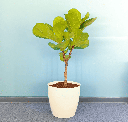Product Specifications
The Fiddle Leaf Fig is known for its large, glossy, fiddle-shaped leaves that can grow up to 15 inches long. The leaves are deep green with prominent veins, giving them a leathery texture. This plant can grow up to 10 feet tall indoors, making it a striking statement piece in any room. It has a relatively fast growth rate and can be shaped into a tree-like form with proper pruning
- Aesthetic Appeal: Adds a dramatic, tropical look to indoor spaces with its large, lush leaves.
- Air Purification: Helps improve indoor air quality by removing toxins.
- Stress Reduction: Having plants like the Fiddle Leaf Fig can reduce stress and improve mood.
- Productivity Boost: Studies suggest that indoor plants can enhance concentration and productivity.
- Feng Shui: Believed to bring positive energy and balance to a room
Light: Place in bright, indirect light. Avoid direct sunlight to prevent leaf burn.
Watering: Water when the top inch of soil is dry. Ensure thorough watering until water drains out of the bottom. Avoid overwatering to prevent root rot.
Humidity: Prefers average household humidity. Mist leaves occasionally, especially in dry conditions.
Temperature: Keep in a warm environment, ideally between 60-80°F (15-27°C). Avoid cold drafts.
Fertilizing: Feed monthly during the growing season (spring and summer) with a balanced liquid fertilizer. No need to fertilize in winter.
Pruning: Prune to maintain shape and remove any damaged leaves. Rotate the plant periodically for even growth
Ques 1: Why does this plant need indirect light?
Answer: Direct sunlight can scorch the leaves. Indirect light helps it grow evenly without damage.
Ques 2: How do I prevent leaf spots?
Answer: Avoid overwatering, provide good drainage, and wipe the leaves occasionally to remove dust.
Ques 3: How can I ensure it grows tall and upright?
Answer: Rotate the plant regularly for even sunlight and use a moss pole or stake if needed for support.






